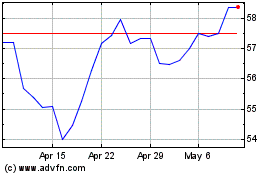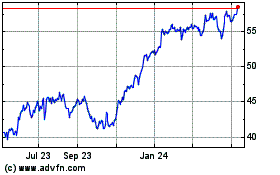Stung by Mutual Fund and ETF Glitch? Ask for a Refund
August 26 2015 - 7:51PM
Dow Jones News
By Leslie Josephs
A software glitch this week at fund administrator Bank of New
York Mellon Corp. caused difficulties in pricing many mutual funds
and exchange-traded funds, prompting some fund sponsors to publish
lists of funds whose stated asset values were erroneous.
What can you do if one of your funds is on the list, meaning you
may have overpaid for shares?
Reach out to your fund company and ask for a refund. They don't
have to give you one but firms may do so because of their often
long-term relationships--ones they want to keep--with investors,
analysts said.
The answers you get may depend on the type of fund you own.
Mutual funds may face easier-to-adjudicate claims because of the
nature of their product, analysts said, and may be more likely to
compensate investors because they and their shareholders tend to be
less trading-focused.
"I think that mutual-fund companies tend to have longer-term
relationship with their shareholders and may be more accommodative,
whereas ETF investors may be more short term in nature," said Todd
Rosenbluth, director of ETF and mutual fund research at S&P
Capital IQ.
Mutual fund trades in general are easier to track, he said,
"because they're executed only once at the close."
In exchange-traded funds, in which investors can buy and sell
throughout the day and whose price can become divorced from the
underlying assets even without the market unrest of this week,
investors' options may be more limited.
Several exchange-traded fund providers, including Guggenheim
Partners LLC, First Trust Advisors LP and Van Eck Global, said the
net-asset values in some funds that were calculated as of the
market close on Monday contained errors greater than 1%. But some
analysts said that isn't a large swing in the ETF world and it
might be possible for providers to argue that they don't owe
investors anything.
Incorrect pricing could affect investor decisions.
For example, First Trust Advisors said Wednesday that the
per-share net asset value of its First Trust Nasdaq Auto Index Fund
on Monday was overstated by 69 cents, which could potentially
inform an investor decision, although some analysts said the amount
is too small to make much of a difference and that most ETF trading
is done independent of the end-of-day price.
"Was the deciding factor in your making an investment decision?
Then I suppose you could, as an investor, claim that you've been
misled and sue" the ETF provider, said Dave Nadig, director of
exchange-traded funds at FactSet.
He said such a claim seems unlikely in response to "one day of
disconnect for a fairly small amount of money."
Write to Leslie Josephs at leslie.josephs@wsj.com
Subscribe to WSJ: http://online.wsj.com?mod=djnwires
(END) Dow Jones Newswires
August 26, 2015 19:36 ET (23:36 GMT)
Copyright (c) 2015 Dow Jones & Company, Inc.
Bank of New York Mellon (NYSE:BK)
Historical Stock Chart
From Mar 2024 to Apr 2024

Bank of New York Mellon (NYSE:BK)
Historical Stock Chart
From Apr 2023 to Apr 2024
